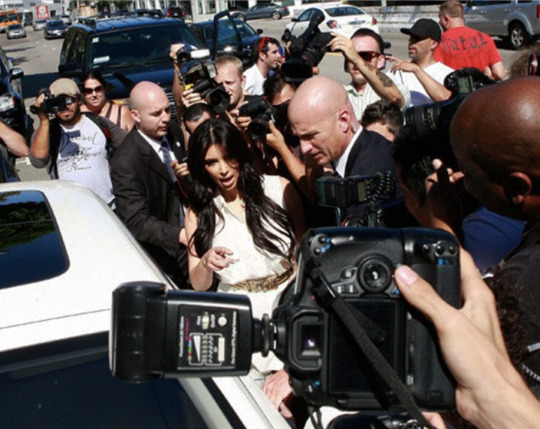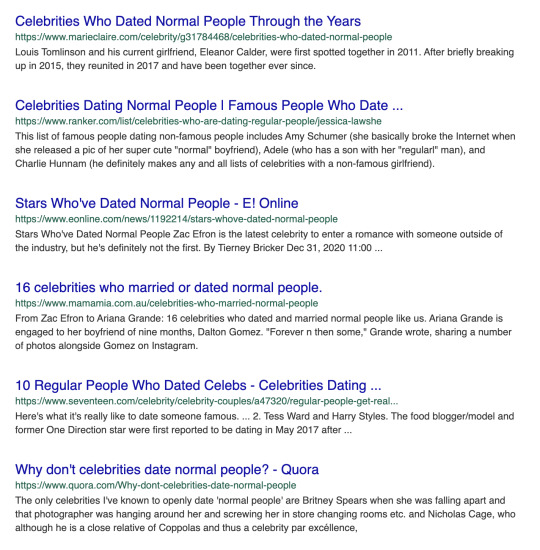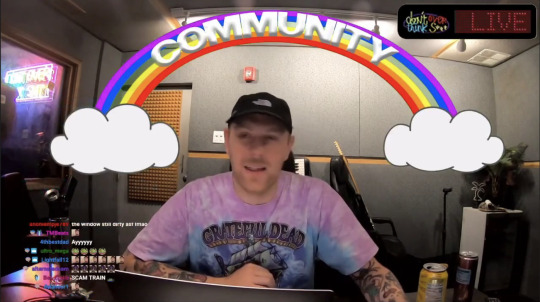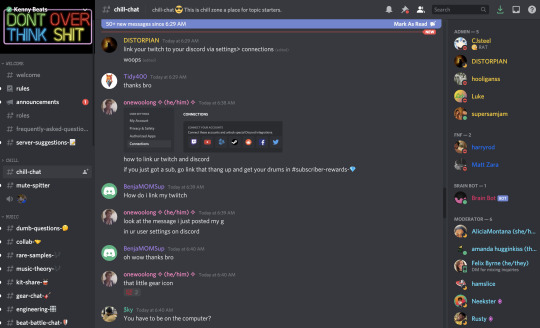Don't wanna be here? Send us removal request.
Text
Bibliography for "Is there a shift in how celebrities are viewed, and is it good??"
Brian H. Spitzberg, William R. Cupach, 2008. Fanning the flames of fandom: celebrity worship, parasocial interaction, and stalking. In: Stalking, Threatening, and Attacking Public Figures: A Psychological and Behavioral analysis. New York: Oxford university press, p. 287.
Gray Jonathan (Jonathan Alan), Sandvoss Cornel, Harrington C. Lee, 2007. Fandom : identities and communities in a mediated world. New York: New York University Press.
Jenkins, H., 2019. Participatory culture [electronic resource], Cambridge: Polity Press.
Kessler, G., 2016. Washington Post. [Online] Available at: https://www.washingtonpost.com/news/fact-checker/wp/2016/05/23/recalling-hillary-clintons-claim-of-landing-under-sniper-fire-in-bosnia/ [Accessed 12 Jan 2021].
Levy, M. S., 2015. Celebrity and entertainment obsession: understanding our addiction. London: Rowman & Littlefield.
Morrison, M., 2016. What Is Fandom And Why Is It Important?. [Online] Available at: https://www.theodysseyonline.com/what-is-fandom-and-why-is-it-important [Accessed 14 May 2021].
0 notes
Text
Is there a shift in how celebrities are viewed, and is it good?? would you agree??
BA (Hons) Media Production
Kane O’Brien (Student ID: s5314184)
My case study for this essay - "is there a shift in how celebrities are viewed by, and interact with fandoms, and is it for the better?"
This essay intends to delve into some new shifts in celebrity perception by a new form of fandom that celebrities are cultivating and how there's a change in how they present themselves and interact with these fandoms. Also looking briefly at the importance of this for society, how with more accessible celebrities there can be less of an invisible social wall between them and how "normal" people feel locked off on one side of it while celebrities know the secret to get over it. But also, with this wall crumbling, celebrities can become more in tune with the real world and less outcast, and seemingly ignorant to the real world and its issues.
I find this case study important to look into even though is still a fairly new shift but such a significant shift because with this change people goals become less impossible. From my experience with getting into music production and with finding a large music producer that casually streams on twitch himself giving advice and showing what he does but just like any other person and showing I can get where I want with effort and that they aren't so far away from normal people.
The two concepts I will use to analyse my case study are Fandoms and Participatory culture. Fandom being looking into the people who have these celebrities as a part of their life more so than just liking their content and participatory culture where the fandoms participate in the content and life of the celebrities. A prime example I will be using throughout this essay will be a music producer by the name 'Kenny Beats', he's a prime example of both a fandom where he's built a community he regularly interacts with and live streams with other celebrities that the fandom tunes into daily and bond over their common "idol". Participatory culture is his main allure to his fandom, he runs a discord community that he gives free royalty-free content, and also linked with his streams the community participates in 'beat battles' where he reviews, gives advice, and has even gotten people signed to labels. He contributes to his fandom and also has the fandom casually participate in his content with even offering salary paid jobs at his business "D.O.T.S"
To state the cores of my chosen concepts are "Fandom as a whole is a subculture that celebrates a mutual bond formed between people over a book series, TV show, movie, band, or other forms of pop culture" (Morrison, 2016), and "the idea that various peoples, societies, and cultures to interact with new media in a way that allows them both to add and take away information from this medium." (Jenkins, 2006) is the core of Participatory culture. These are the most important concepts for this case study as having a good fandom allows for a blossoming community that can feel connected to and understanding of the celebrity, having good participatory culture allows for that fandom and other participants to offer something to the media or industry they desire to be a part of and feel a connection rather than separated as people and the media and its celebrities. Of course, though with fandoms there's the risk of them becoming toxic with a higher feeling of entitlement and gatekeeping to others making the celebrities even more dejected from normal society and even less accessible.
although I do firmly believe that the integration of participatory culture it levels that out allowing the celebrity to intervene and shape their community. As with participatory culture being endorsed in new fandoms, it allows a level of self-governing where they can communicate with the celebrity in question to allow changes to be made that the people want and can solve issues of toxicity directly.
This is the basis of what I desire to focus on and evaluate to reach the answer of my case study with my research to bring this to light and create discussion on the topic.
is there currently a shift in how celebrities are viewed by, and interact with fandoms, and is it for the better? In the past and up till recently celebrities were viewed in a very specific way as idols and out of reach and touch with "normal people", they are regularly presented as beings above the rest of us and people obsess over their lives seeing them as "the best of the best" or remarkable idols, it's a strange obsession developed over years. (Levy, 2015) (for example, how people are obsessed when they date "normal" people rather than other celebrities)


with this presentation and obsession, celebrities are dejected from societal norms and the issues that go on around them. For example, "A-list" celebrities like Drake, Jamie Fox, and others don't interact commonly with "normal" people or have their fans/fandoms participate in their lives casually or in their work having suggestions or adding something to the content these huge celebrities create and fans love. But in recent years there's been a shift in a few of the "lower tier" celebrities where they develop a community that feels involved but not entitled to the lives of these people. The best example of this and who I will regularly refer to is music producer 'Kenny Beats' who has produced some of the biggest Hip-Hop songs in recent years and is extremely idolised and respected.


Kenny Beats started a YouTube show In March of 2019, in this show he casually met up with huge celebrities in Hip-Hop and it showed these people and himself joking around in a studio that seemed 3rd rate, it showed a human side to these people and started a fandom around him and these people that weren't obsessed in the common way celebrity fandoms are. Then at the start of the Covid-19 pandemic, he started a Discord community for his fans to talk to each other and communicate with him in, as well as a Twitch live stream where the new wave finally began for this shift in celebrity representation and community. He would casually talk to this community as a member rather than "the face" a sole reason for it, he would take fan advice and that would go into real songs, his fandom actively participated in his work and he actively participated in theirs. This wave of participatory culture developed his fandom into an organic and casual state where he would get people jobs and signed to a label but also where these "normal people" were a part of his content and art. His Fandom became something casual, and the people never saw him as some famous pariah they idolised and obsessed over, they don't pry or feel entitled to his or his celebrity guests/friend life like most fandoms act.
Although this sounds great and progressive on the surface, with this shift towards this new wave of fandom and fan interaction there comes risks. People are so set in their ways of idolising and believing in their right to know about their favourite celebrities. If the more "A-list" celebrities with these already obsessive fans and invasive swamping paparazzi culture around them take a step in this direction of cultivating a fandom with real participation between them and their community, without a smart and smooth transition and commitment they run the risk of cultivating and growing the toxic and entitled way of thinking further removing them from "normal society" and have a huge surge of gatekeeping and people feeling more entitled as they now have a community the celebrity is involved in. especially with cancel culture growing and growing where even then with a casual approach they run the risk of people not liking if their expectations aren't met. And this causes celebrities to become more detrimental to themselves and is what creates the commonly seen narcissism in celebrity culture, this toxic isolation and obsession with their lives creates many issues for celebrities and their fans (Brian H. Spitzberg, William R. Cupach, 2008)
But this is changing, slowly but surely. With a couple of celebrities that are much more high profile than 'Kenny Beats' but following in his footsteps with this shift in. fan interaction, these being 'Snoop Dogg' and 'T-Pain' now also doing regular streams on the platform Twitch and shows them doing pretty normal stuff and grounding them. Snoop Dogg now regularly streams games he plays and takes recommendations from his fans and just using twitch, in general, entices participatory culture on the fan side of actually having a part in this new venture of his into streaming.
T-Pain also streams and has a discord very similar to Kenny Beats, but T-Pain focuses more on a discussion about the music industry and helping his fandom to feel secure and capable but in a realistic way rather than the old "you can do anything" crap. He shows a side we don't get to see from most other huge celebrities and shows the truth of how he's just a guy that worked hard and slowly became famous and that it doesn't happen overnight. Showing that this shift so far is positive and has created very friendly and inclusive fandoms where participatory culture plays a huge role in its success and casual nature rather than the toxic obsession format we're used to.
The celebrities we see taking part in this shift are also far more involved in talking about the real-world problems which is a great thing as celebrities are a huge factor in what people care about and are exposed to, especially where fewer and fewer people watch/read news sources and its mostly through word of mouth and public figures addressing it, celebrities that have these more caring and social fandoms are detrimental these days for the awareness of distant suffering issues and it's improving from the old ignorant ways of celebrities and their narcissism due to their activity and participation with the fans who are caring of these issue's and contribute to the celebrities world education and vice versa (Scott, 2014)
Personally, for this topic, I do find it important. I'm very passionate about getting g into the media industry and more specifically into music production, but that sort of career was always a very far-off dream and so very inaccessible to some random kid from a small town in England where nothing ever happens. But finding 'Kenny Beats' who I spoke on in the main essay changed that way of thinking for me. I originally had a lot of disdain for the sort of celebrity culture and the fandoms that surround them as most are toxic, obsessive, and filled with gatekeeping. For example, used to be extremely into metal music but the fandoms in that are elitist and unwelcoming to anyone who doesn't know everything, but when I found Kenny Beats fandom and how he interacts with everyone and that they participated with him I was amazed and felt welcomed, and everyone is there teaching each other all the time about music and even just talking and helping people just with anything. It re-inspired me to do what I was passionate about as I saw him as just another guy that was good at what he does and that he cares and helps people, he even ended up getting a 16-year-old boy from Scotland signed to 'XL Records' (the label that does Adele and Radio head!) this new, completely different fandom to what I'd ever seen before inspired me and helped with my anxiety of wasting my time working for a "silly pipe dream of a career"
So, in conclusion to my case study. I feel the answer is yes, in my opinion, we are starting to see celebrities more and more as people rather than commodities and it's an incredibly good thing for society as these people are important to the public's decisions and what we are exposed to and care about. And with them being more grounded they can be more involved in the world rather than dismissed because they're "dumb celebrities". Although yes there are the risks of cultivating a more toxic and entitled community with higher-profile celebrities but with something as simple as starting with a good social presence on a platform like Twitter, especially like 'Lil Nas X' who is rather huge now but is seen as a rather normal person from his casual and human-like tweets that ground him and make him relatable. because that's all it is in the end, celebrities need to take this shift and become more grounded and relatable to the "normal" person, and this shift is that starting to happen, and it will help the world and its people be better. slowly but surely, at least in my opinion. what's yours??
(please use this link to see sources used, recommendations for future use are welcomed)
1 note
·
View note